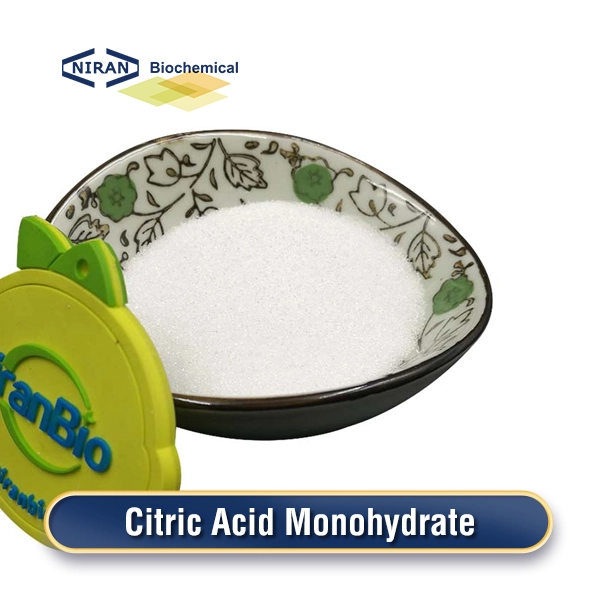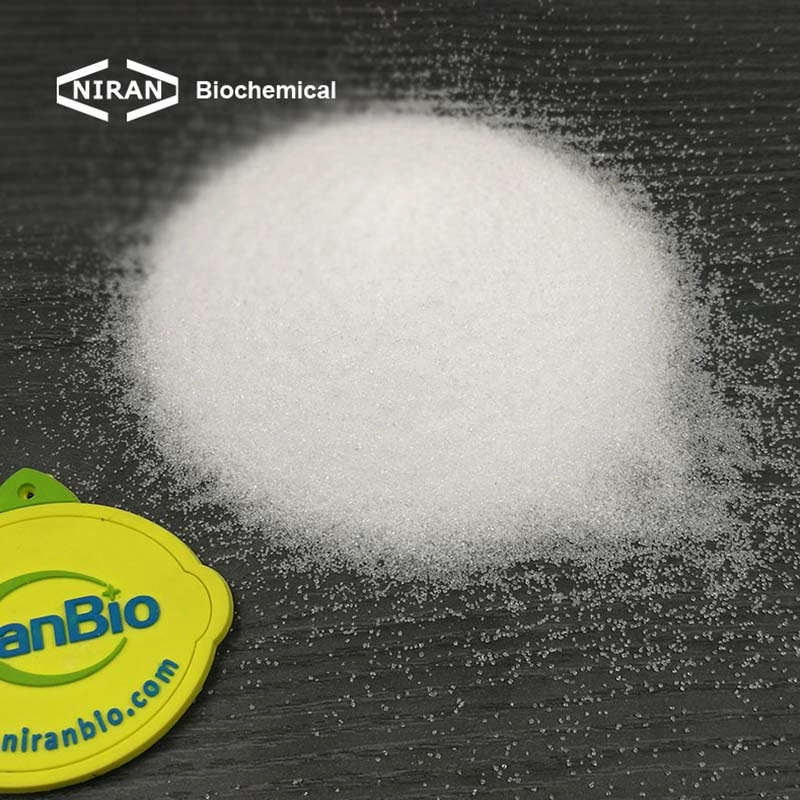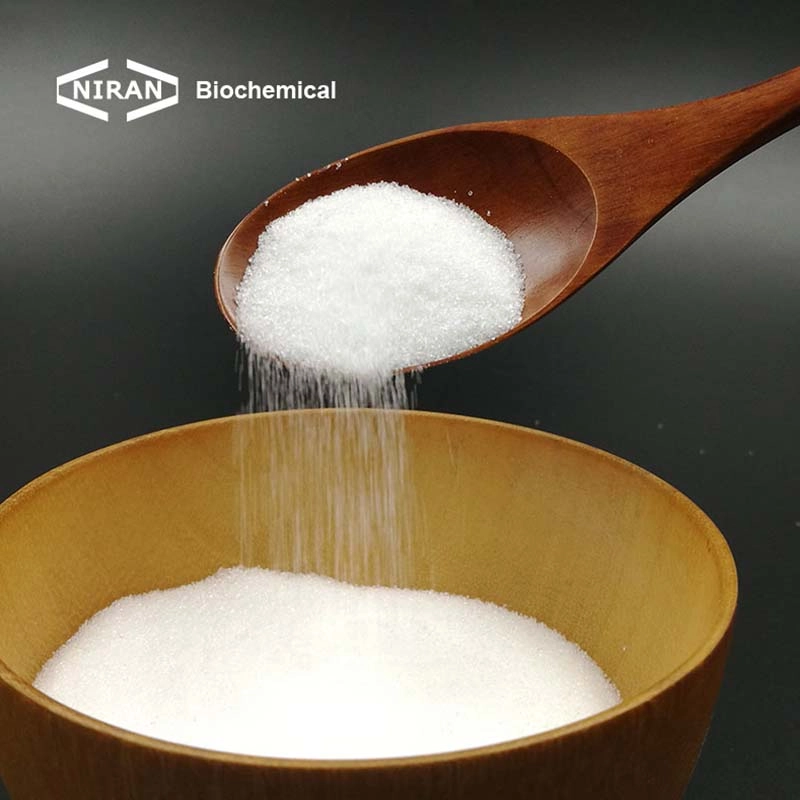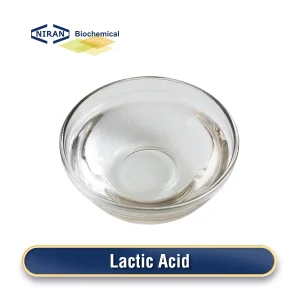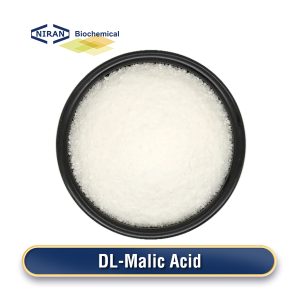Niran Biochemical
YOUR RELIABLE FOOD INGREDIENTS
Send Inquiry
Home » Products » Acidulants » Citric Acid Monohydrate
Citric Acid Monohydrate
- CAS: 5949-29-1
- Chemical Formula: C6H8O7·H20
- Certification: KOSHER, ISO, HALAL, FSSC22000, BRC, etc.
- Standard: Compliant with BP/USP/FCC
- MOQ: 1000KG
- Shelf Life: 3 Years
Inquire Product
Product Description
What is Citric Acid Monohydrate?
Citric acid monohydrate has the appearance of white crystalline particles or powder has no pungent odor, and tastes very sour. It is easy to weather in dry air and easy to clump in humid air. When dealing with clumps, the bag can be thrown. Therefore, the bag can be turned over regularly during storage to effectively prevent clumps. It is often used as a food additive such as a flavoring agent, a fermentation agent, a sourness enhancer, and an acidity regulator.
There are two methods to produce citric acid monohydrate. One is to use corn, cassava, and other starch as raw materials and produce it by microbial fermentation, which is also the mainstream method for producing citric acid monohydrate on the market; the other is to extract it from acid-rich raw materials, especially for comprehensive utilization in fruit processing, such as the salty and sour juice discharged after plum embryo production, which has an acid content of 4-5%. The salty and sour juice discharged after citrus embryo production is a good raw material for extracting citric acid.
Related parameters:
| Items | Standards |
| Assay | 99.5%-100.5% |
| Moisture | 7.5%~8.8% |
| Oxalic Acid | 100 ppm Max |
| Sulphate | 150 ppm Max |
| Residue on ignition (sulphated ash) | 0.05% Max |
| Heavy Metals | 10 ppm Max |
| Mercury | 1 ppm Max |
| Lead | 0.5 ppm Max |
| Arsenic | 1 ppm Max |
| Aluminium | 0.2 ppm Max |
| Bacterial Endotoxins | 0.5 IU/mg Max |
| Trilaurylamine | 0.1 ppm Max |
| Calcium | 200 ppm Max |
| Iron | 50 ppm Max |
| Chloride | 50 ppm Max |
Recommended dosage:
Citric acid monohydrate can be used in food processing, and beverage production, and can also be used as a cleaning agent. Add according to specific needs when using.
| Food name | Maximum usage(g/kg) |
| Carbonated beverages | 0.2-0.5 g/kg |
| Starch products | 0.1-0.3 g/kg |
| Ice cream | 0.2-0.3 g/kg |
| Seasonings | 0.2-0.5 g/kg |
| Bread | 0.1-0.2 g/kg |
| Dairy products | 0.2-0.3 g/kg |
| Quick frozen food | 0.1-0.3 g/kg |
| Jam | 0.3-0.5 g/kg |
| Canned food | 0.2-0.4 g/kg |
| Pickled food | 0.2-0.4 g/kg |
| Gel candy | 0.3-0.5 g/kg |
| Nutritional beverages | 0.2-0.4 g/kg |
Citric acid monohydrate has a wide range of uses
1. Bactericidal effect
Citric acid monohydrate has a significant bactericidal effect. When used in combination with a temperature of 80°C, it can effectively kill bacterial spores, which is particularly effective for contaminating bacterial spores in the hemodialysis machine pipeline. In addition, it can achieve the purpose of antibacterial by destroying bacterial cell membranes, interfering with the synthesis of bacterial enzymes, and affecting the replication of bacterial DNA.
2. Appetite promotion
Citric acid monohydrate has the effect of promoting appetite. It can not only be used as a condiment for daily cold dishes to make the food taste better and have an appetizing effect, but also improve the sensory properties of food and further enhance appetite.
3. Buffering
Citric acid monohydrate has a buffering effect in feed and produces a synergistic effect with other ingredients in feed. This buffering effect is mainly reflected in reducing the buffering capacity of protein and fat in feed, which helps the absorption and metabolism of these nutrients. Due to the reduction in buffering capacity, the amount of food eaten and digested will also be affected, which helps to improve the overall utilization rate of feed by animals.
4. Anti-stress
Citric acid monohydrate has a significant effect on anti-stress. In aquaculture, due to various environmental factors such as water pollution, excessive breeding density, low dissolved oxygen, high ammonia nitrogen and nitrite content, aquatic animals are prone to stress, resulting in reduced anabolism, increased catabolism, weakened immune function, etc. Citric acid monohydrate can effectively alleviate these stress reactions, thereby maintaining the health of animals, improving their immune function, and helping to maintain normal metabolic activities.
5. Degreasing
Citric acid monohydrate also has a significant effect in degreasing. Especially in aquaculture ponds, algae films and oil films can disappear quickly after using citric acid. This is mainly because citric acid has good cleaning and decontamination capabilities and can effectively decompose and remove oil. Therefore, citric acid is not only useful in household cleaning, but also in industrial and agricultural fields, such as the maintenance of aquaculture ponds, showing its powerful degreasing effect.
6. Acidulants
Citric acid monohydrate is a commonly used acidity regulator. In the food and beverage industry, it is mainly used to adjust the acidity of products and give foods and beverages a specific taste and flavor. In addition, citric acid monohydrate also has a preservative effect and can extend the shelf life of products. In the pharmaceutical industry, it is also used as an acidity regulator for drugs to ensure the best absorption and effect of drugs in the body. In general, citric acid monohydrate has a wide range of applications in many fields, mainly to adjust acidity and improve product quality.
User asked question:
Q: How to store citric acid monohydrate?
A: Please place it in a light-proof, sealed, ventilated, dry and cool place, which will help maintain the stability of citric acid monohydrate, avoid deterioration caused by high temperature or high humidity, and ensure that citric acid monohydrate can maintain its original chemical and physical properties during storage.
Q: Can food-grade citric acid monohydrate be used in medicine?
A: Food-grade lemonade monohydrate is often used in medicine because it acts as an acidifier and pH regulator in drug formulations and can well control the acidity of a drug, such as effervescent tablets, syrups and other oral medications, where acidity plays a vital role in stability and absorption.
Q: Frequently asked questions during transportation
A: When transporting citric acid monohydrate, it is common to encounter packaging damage, product agglomeration or solidification. This is because it is easy to absorb moisture, especially in a high-temperature environment; sealed and moisture-proof packaging materials can be used to reduce the intrusion of moisture.

